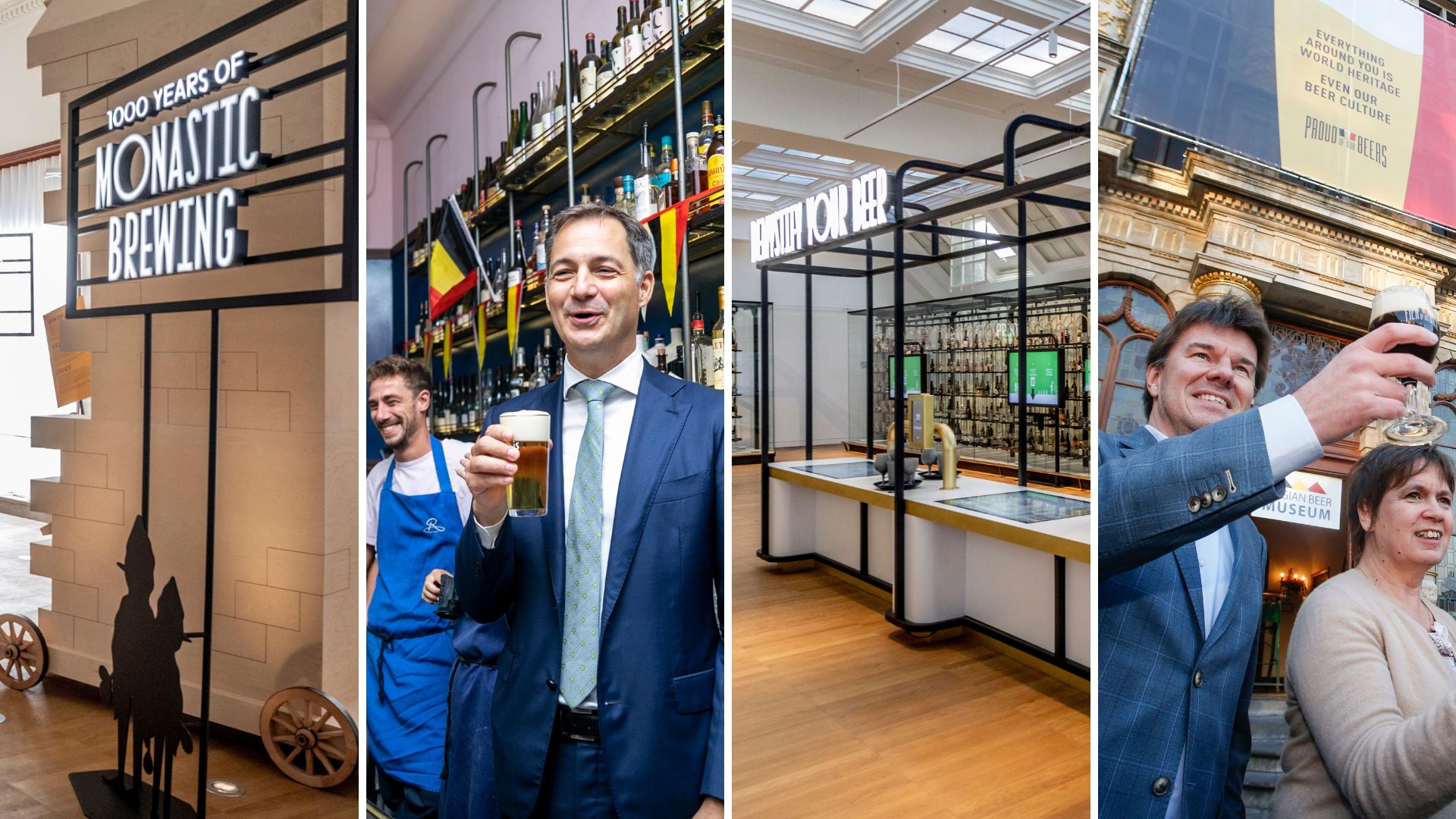As soon as Belgian Prime Minister Alexander De Croo (Open VLD) had cast his vote in last Sunday’s Belgian and European elections (just before 10:00) he headed for nearby pub ‘t Bierpotje (‘the beer jar’) in his hometown of Brakel and ordered a local brew. He then went for a run with his wife.
De Croo, whose family owns a different pub in Brakel, has never disguised his fondness for beer. Google “Alexander de Croo” and “beer” and dozens of photos of the politician raising a glass of barley brew come up. In an episode of ‘Het huis’ on VRT, we see him thoroughly enjoying a glass of the speciality beer Omer. At the World Economic Forum in Davos, he and former Microsoft CEO Bill Gates can be seen smiling broadly while pouring pints of Stella Artois.
In March, De Croo visited The Musketeers brewery in Sint-Gillis-Waas, as part of a campaign roadshow by the beer federation Belgian Brewers. The Prime Minister is not the only Belgian politician with links to the beer industry. The brewers’ federation maintains close ties with dozens of influential politicians who openly advocate for the sector's interests. Among them are Socialists, Flemish nationalists and Christian democrats, as well as many Liberals.
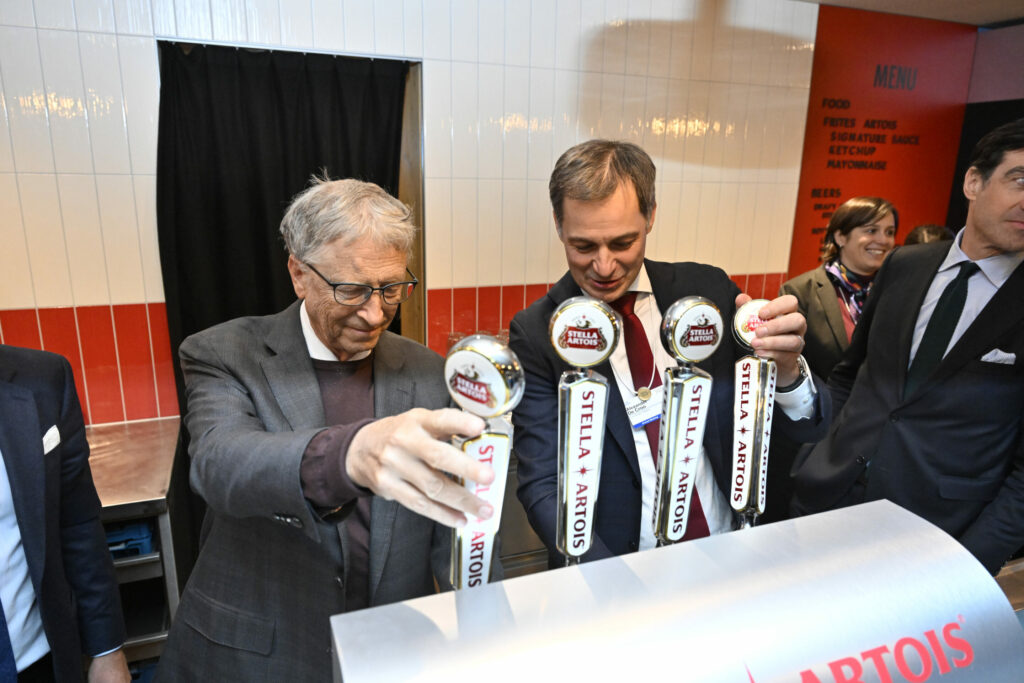
Bill Gates and Prime Minister Alexander De Croo serve Stella Artois beer at the 2024 World Economic Forum, January 2024. Credit: Belga
The central figure in this network of brewers and politicians is the current Brussels Minister of Finance and Budget, Sven Gatz (Open VLD). The Brussels native has long harboured the ambition to put his city on the map as the beer capital of the world. In 2008, while still the Open VLD faction leader in the Flemish Parliament, Gatz founded “Brussels Beer Capital of the World” – a non-profit organisation aimed at promoting Belgian beers and breweries, particularly those from Brussels.
Two years later, he was instrumental in establishing the Belgian Beer Club, a group of around 100 Flemish, Walloon, and Brussels politicians advocating for the interests of the brewing sector. According to Gatz, the Beer Club was established at the request of Belgo-Brazilian beer conglomerate AB InBev, the world’s largest brewer.
“I have always been very transparent about this," Gatz told us. There is no beer culture without the beer industry. I realised already back then that this was a form of advocacy. It is impossible to support the interests of the beer culture without the beer industry. It might seem like I only support the beer industry, but for me, it is mainly about the beer culture."
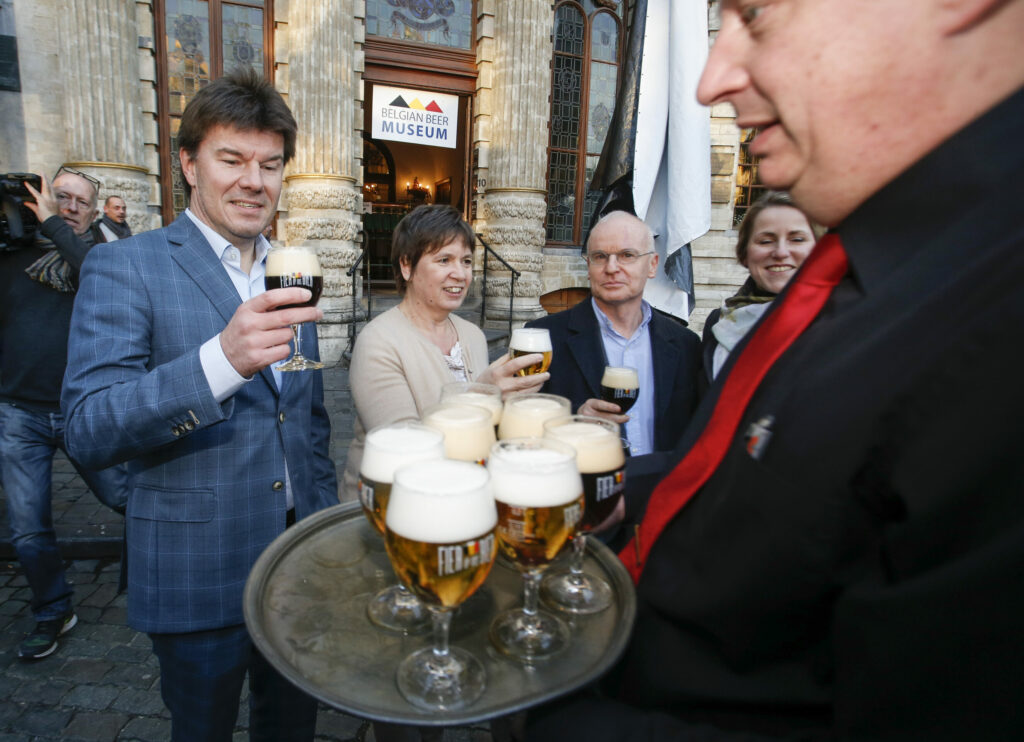
Sven Gatz (left) during a toast to celebrate the official UNESCO recognition of Belgian beer culture, November 2016. Credit: Belga
Too much of a good thing
At the time of Beer Club’s launch, the Federal Government was busy exploring ways to regulate the availability and marketing of alcohol products more strictly, particularly among young people. This was partly at the urging of the World Health Organization (WHO), which in 2000 had warned about the significant societal impacts of alcohol abuse and had called on its member states to take action.
The government agreed to implement the WHO's recommendations "to the extent that they are compatible with the tradition, culture, and public opinion on this matter." This proved rarely to be the case. Thanks to opposition from the alcohol industry and its political allies, almost every government attempt to restrict the availability and marketing of alcohol products failed. Voluntary agreements were made with the sector to limit alcohol advertising targeting young people, and the legal minimum age for purchasing spirits was raised to 18 years. But that was all.
According to Ruben Kramer of the Flemish Expertise Centre for Alcohol and Other Drugs (VAD), the establishment of the Belgian Beer Club fits within the alcohol industry's strategy. “A frequently used aggressive lobbying strategy from the tobacco and pharmaceutical industries, which is also seen in the alcohol industry, is to engage important individuals with political authority or influence. Given his background as the brewers' director, there is a very clear link between politics and the alcohol industry through Sven Gatz, but he is certainly not the only one,” Kramer explained.
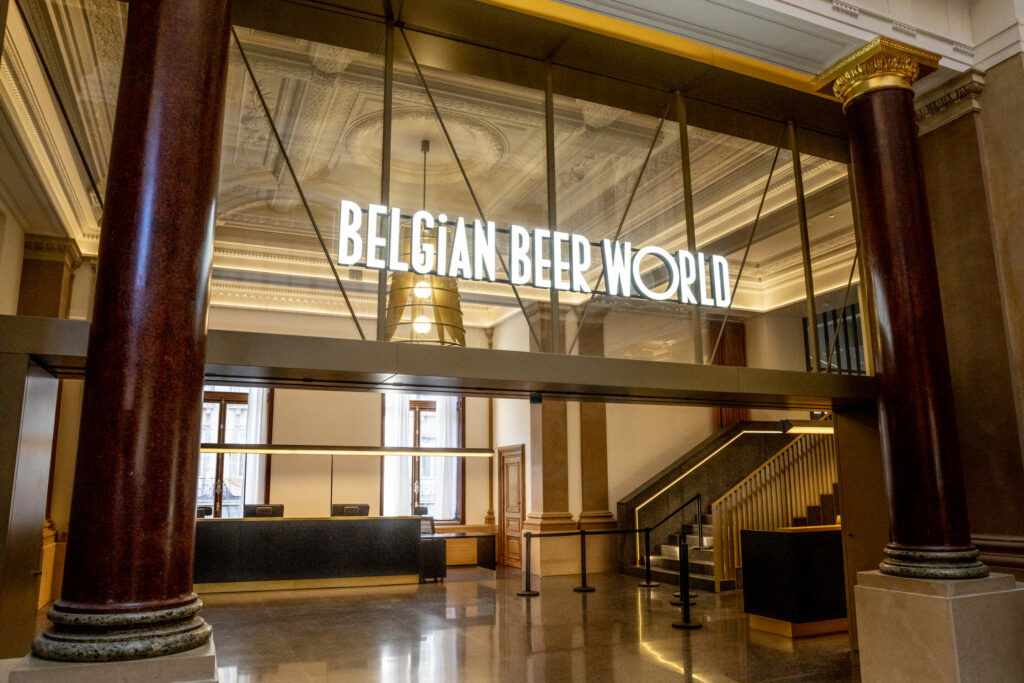
Belgian Beer World in the renovated Bourse building that used to house the Belgian stock market, September 2023. Credit: Belga
In 2011, Gatz, then still a Flemish MP, was asked by the brewers' federation to become its new director. He agreed. For three years he was the most prominent beer lobbyist in Belgian politics. During that period, along with Brussels tourism Alderman – now Mayor – Philippe Close (PS), he managed to secure political support at the national level and in Brussels for his plan to transform the old Brussels Stock Exchange building in the centre of town, the Bourse, into an ‘experience centre’ dedicated to Belgian beer culture: the Belgian Beer World.
This was a multi-million euro project, largely funded by taxpayers. Objections from opposition parties, local residents, and cultural heritage organisations were largely ignored.
That same year, Gatz was recognised for his years of commitment to the interests of the beer sector. He was made an honorary knight in the Knighthood of the Brewers' Paddle, the descendant of the centuries-old brewers' guild, which now serves as an extension of the brewers' federation.
Honorary knights are individuals who, according to the brewers, "have made significant contributions to the Belgian brewing sector commercially, politically, or socially, and will henceforth act as ambassadors for the brewing world." The honorary knights must swear to defend the interests of the brewers. Besides Gatz, their number includes prominent politicians such as Prime Minister De Croo, European Council President Charles Michel, Brussels Mayor Philippe Close and EU Commissioner Didier Reynders.
Public health and the law
In July 2014, Gatz returned to politics as Flemish Minister for Culture, Youth, Media, and Brussels. In this capacity, he succeeded in having the Belgian beer culture recognised by UNESCO as intangible cultural heritage. This was based on a dossier prepared by Gatz himself when he was still the director of the brewers' federation.
In what will have come as a surprise to Belgium’s alcohol prevention NGOs, UNESCO justified its decision by noting that the Belgian beer culture pays significant attention to combating excessive alcohol consumption. Meanwhile, a 2016 study commissioned by the Federal Government estimated the social cost of alcohol consumption at around €2 billion per year. Additionally, the 175,000 healthy life years lost resulted in a non-financial welfare cost of around €7 billion, the study found.
In 2018, Minister of Public Health Maggie De Block (Open VLD) asked the High Health Council to establish guidelines for the sale of alcohol to minors. The Council advised raising the minimum age for purchasing beer and wine to 18 years and banning alcohol advertising and sponsorship entirely.
Despite research showing that most Belgians support such measures, De Block rejected the advice. The beer lobby, in which De Block's party colleagues play a prominent role, prevailed once again.

A weekend action against drunk driving, organised by the federal police and 117 police zones, part of the Bob campaign to raise awareness of the dangers of drink driving. Credit: Belga
A conflict of interest?
When Sven Gatz joined the Brussels Regional Government in 2019 as Minister of Finance and Budget, he got the chance to continue working on the project that was closest to his heart: the Belgian Beer World. After proudly proclaiming in 2017 that he had not been involved with the project since becoming a Flemish Minister, he now picked up where he had left off. On his initiative, the Brussels Region allocated millions of euros to the prestige project, whose costs only kept rising.
According to Isabelle Pauthier, until last Sunday’s elections a Member of the Brussels Regional Parliament for green party Ecolo, Gatz was guilty of a clear conflict of interest. “On this file, we constantly see Gatz’s name appearing at crucial moments. Ultimately, he is the one who invests €12 million in the project from his own budget,” she told us.
Gatz angrily reacts to this allegation. “I have always been transparent. I haven't done anything that wasn’t allowed. When I worked with the brewers, I didn’t know I was going to become Flemish Minister of Culture. And I also didn’t know I would later become Brussels Minister. A conflict of interest? Don’t make me laugh. These constant rumours, the baseless insinuations. It’s tiring. But anyway, I have no regrets. I am proud of what I have done.”
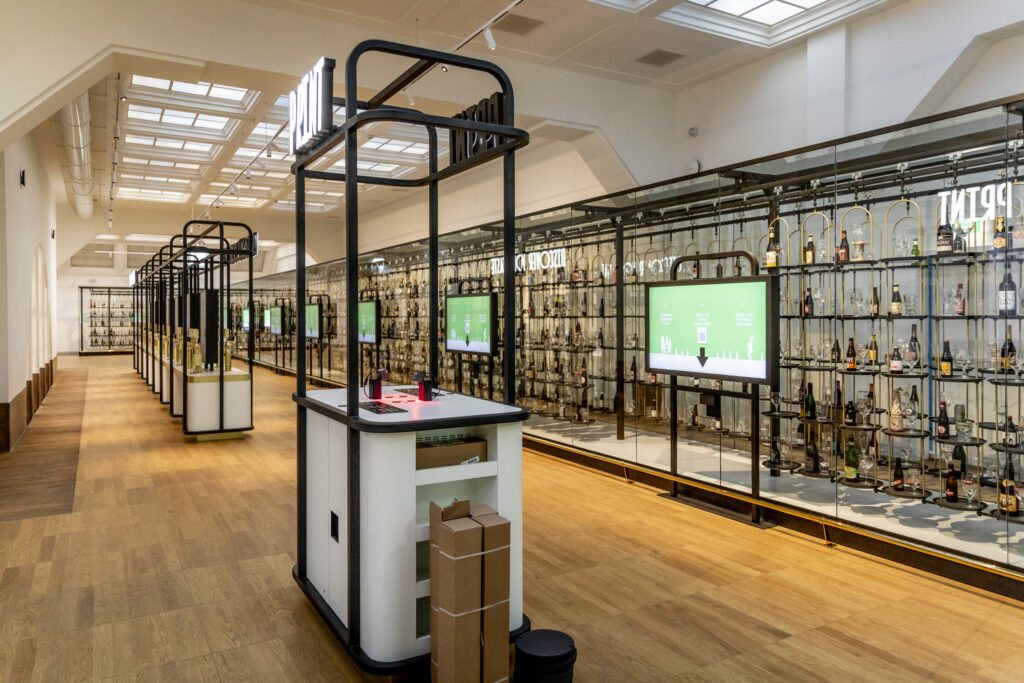
Belgian Beer World didn't come cheap, costing some €12 million in taxpayer funds. Credit: Belga
When Belgian Beer World opened its doors in September 2023, Gatz said he was a happy man. “Brussels has a new jewel in its crown as well as many square metres of pedestrian zone. The beautifully renovated Stock Exchange building is the gateway to our renowned Belgian beer culture.”
Isabelle Pauthier begs to differ. “There has long been a proposal to open a migration museum in Brussels. That would help many young people understand where they come from. According to Brussels Minister-President Rudi Vervoort, there was no budget for that. The funds all went to Belgian Beer World, a mass tourism project that normalises alcohol consumption, even though we know that alcohol consumption among young people is a major problem.”
Ruben Kramer of the VAD agrees. “Unfortunately, the dominant narrative is still that alcohol is something positive and cheerful, and not that it carries all kinds of risks. As long as there is a positive narrative, it’s beneficial for the industry, and they will get the government to invest in it.”
Raining on our parade
This spring, the High Health Council again advocated raising the minimum age for purchasing beer and wine to 18 years. The Council referenced the latest stance from the WHO, which concluded early last year that there is no safe level of alcohol consumption. Even light or moderate use increases the risk of more than 200 conditions, including various cancers, according to the WHO.
Former beer lobbyist Gatz is unimpressed. “If you always follow the doctors, you won’t be allowed to do much. I understand the health professionals. They are constantly confronted with problematic alcohol use. And of course, that is terrible. It destroys lives, it causes violence. So I understand them. On the other hand, I also believe there should be the freedom for people to consume alcohol.”
On 1 July, the new alcohol and tobacco law drawn up by Minister Vandenbroucke will come into effect. It bans the sale of alcohol from vending machines and imposes restrictions on alcohol sales in hospitals. Petrol stations on motorways will no longer be able to sell alcohol between 22:00 and 07:00, except for on-site consumption.
Related News
- Passion-over-profit drives the microbreweries of Brussels
- 'We're giving to billionaires, damn it!': Gueuze godfather's fight for authentic brewing
- A whole new world for Belgian beer
The High Health Council welcomes the new rules but feels they do not go far enough. “Every drop of alcohol increases the risk of serious diseases. Yet the public remains largely unaware of these risks. The alcohol industry invests heavily in romanticising alcohol consumption, fostering social acceptance. Especially among young people, who are naturally more vulnerable, the impact is significant,” the Council said in its response.
Meanwhile, a decision from the minister on new health warnings in alcohol advertisements is still awaited. In April a draft ministerial decree caused unrest within the alcohol sector. In an attempt to prevent regulation, the sector recently adapted its voluntary warnings. Instead of the slogan “our craftsmanship should be enjoyed wisely,” advertisements for alcoholic drinks will now be accompanied by the warning “alcohol abuse harms your health.”
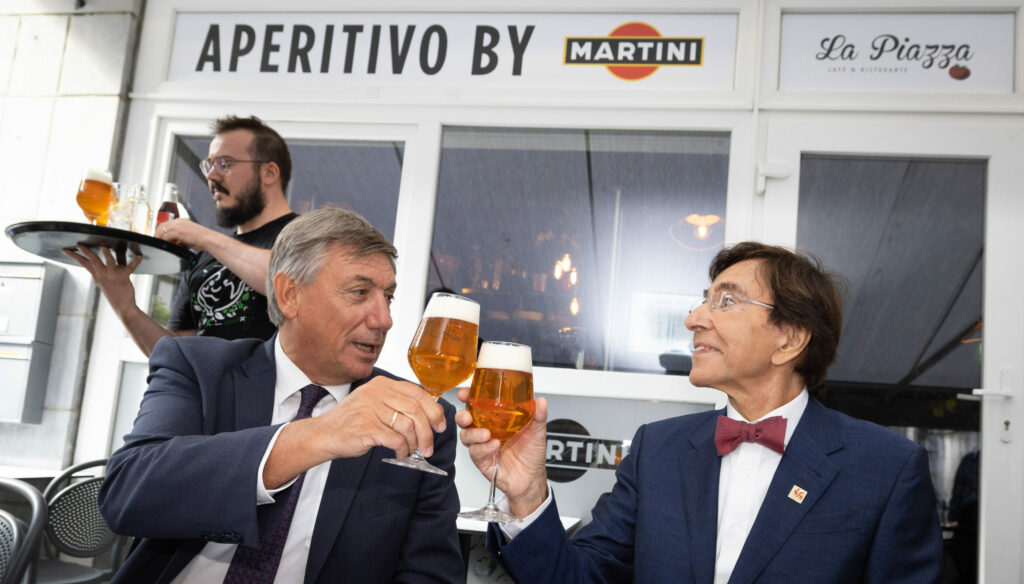
Whether right or left, beer and politics go hand in hand in Belgium. Flemish Minister-President Jan Jambon and Walloon Minister-President Elio Di Rupo toast in Namur, August 2023. Credit: Belga
According to Ruben Kramer of the VAD, this is still not enough. “As long as the alcohol industry continues to spread the message that alcohol itself is not dangerous, they can justify its sale. They shift the responsibility to the group of problem users, while we know very well that alcohol is inherently dangerous. From the first drop, the risk of health damage increases,” Ruben said.
The sector itself is not taking any chances. This spring, the Knighthood of the Brewers' Paddle inducted a new honorary knight: Melissa Depraetere, chairwoman of Flemish Socialist party Vooruit. As it happens, this is also the party of Health Minister Vandenbroucke, who must decide on the new health warnings. The beer lobby has not lost its touch.

